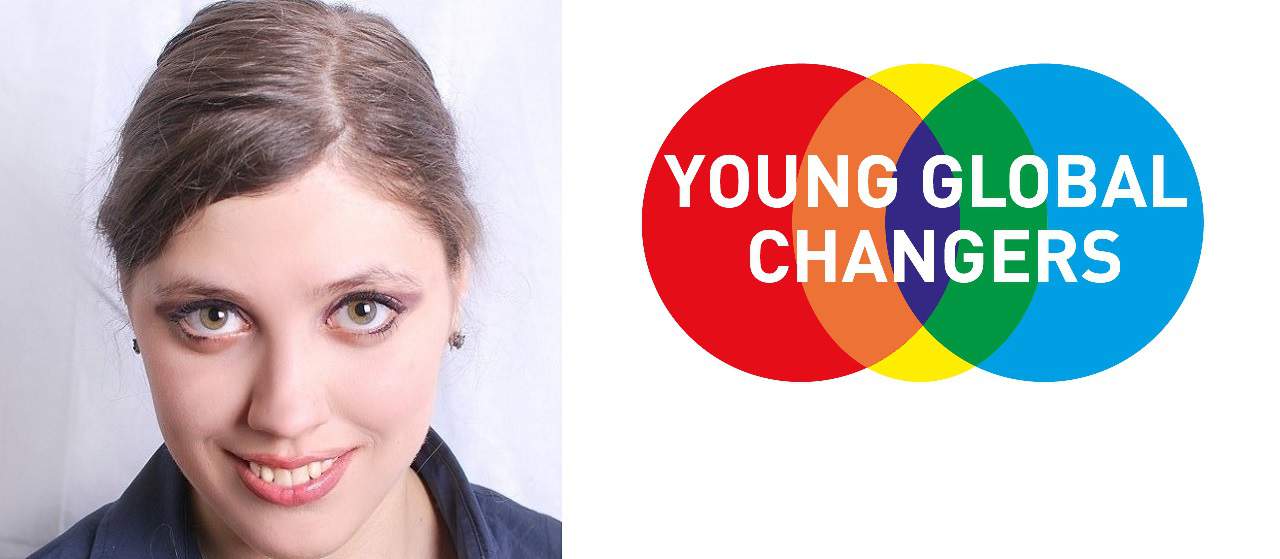
By Yelena Novikova
Yelena Novikova, a Young Global Changer from 2017, about the impact the Global Solutions Summer School program has had on her professional life.
Yelena, can you tell us about your journey before you became a Young Global Changer?
I had quite a wide variety of academic and professional experience before applying to the Young Global Changers program. In fact, I had four university degrees from three different universities. Additionally, I was fortunate enough to have some of the most amazing London-based industry professionals among my colleagues and mentors. I even convinced an incredibly sought-after Harvard scholar to supervise my dissertation at the Grenoble Ecole de Management, knowing quite well that he did not have much time to spare assisting students.
It sounds as though you were prepared to begin a successful career. Why did you apply for the Young Global Changers program?
Despite having achievements to build on, things were not always falling into place for me. There was one consistent pattern: People were eager to recognize my abilities, they were receptive of my out-of-the-box ideas and they sought my insight, but only after they got to know me. Getting my foot through the door was usually the most insurmountable task for me.
As I heard that the Global Solutions Initiative was interested in youth-driven solutions, I was experiencing this far too familiar challenge of getting through yet another set of metaphorical doors. The web announcement literally screamed at me: “Come on, it’s you they’re looking for!”
Let us talk about your ideas. What made them special, yet still unheard of?
While interning at a London-based think tank, I identified a gap in research on Environmental, Social & Governance (ESG) Integration. I had some concrete ideas as to how to fill this gap, but it was too time- and resource-consuming for a small non-profit to pursue. They were already stretched. This prompted me to go back to business school and pursue my idea on my own. That is how I started developing the ideas that later proved to be synergetic with what the G20 Green Finance Study Group (as it was known in 2017) was working on.
In addition to these more romantic and enjoyable parts of my work, there were battles for my policy research & advocacy ESG work. I had to fight daily to explain what I was doing to my fellow countrymen and women. As I mentioned in my TEDxTalk, back in 2011-2012 when I first started looking at what was happening on ESG front in Central Asia, even Google returned zero relevant results when I searched “ESG in Kazakhstan”.
What were some of the obstacles you encountered?
I prefer to give positive interviews. I usually leave out the strange experiences I had as I tried to get in touch with decisionmakers locally and regionally. For example, there were awkward calls to decisionmakers in Kazakhstan, where a personal assistant on the other end unironically asked me “who my father was” when deciding whether to put me through to her boss. Other situations include side-notes seen on a project grant application form, where the individual wrote they were not sure ESG Integration “was a thing.” That occurred at roughly the same time as the Kazakhstan Stock Exchange was preparing to join the ESG-centric Sustainable Stock Exchanges Initiative! Another uncomfortable situation was when an editor asked me if my “Op-Eds were based on my own conclusions”.
In each of these situations I managed to persuade the individuals to hear me out, but I frequently felt like I was a priori presumed to be wrong –especially when it came to advocating for the adoption of ESG integration practices in Kazakhstan.

Did these experiences change after you participated in the Young Global Changers program?
Being a Young Global Changer gives me a 30-second time credit to win people over when I meet them for the first time. It may seem surreal, but in our fast-paced world, which is over-saturated with information and people all broadcasting their own messages, having people truly listen to you for 30 seconds can mean the difference between failure and success! Yet, the “Young Global Changer” opportunity hasn’t just made my mission in Kazakhstan easier. It also helped me broaden the international reception of my ideas and thoughts as well.
While I cherish the incredible opportunity to meet with other Young Global Changers and to publish my short piece in the 2018 Global Solutions Journal alongside contributions from Angela Merkel and Nobel Laureate Edmund Phelps, I think the indirect outcomes of my participation as a YGC are at least as important. For example, I have been interviewed and written about in English, French, Russian, Arabic and other languages over the last couple of years. For me and many other alumni, exposure from the Young Global Changers program has translated into international interest, opportunities and speaking engagements. Over the last year alone, I took to a variety of stages ranging from small closed-door Evening Session for civic experts in Herrsching, Bavaria to co-paneling a discussion with Emmy-nominated host Phillippe Cousteau-Jr and the Minister of Water Resources in a room full of Egyptian ministers, journalists and other changemakers.
Looking back at the obstacles you overcame, why were they there in the first place?
I need to add a bit of a disclaimer before I answer this question. There were (and still are) many contextually-specific circumstances to my story. I represent many different things, in addition to being a young person and a woman. This makes it hard for me to attribute these hurdles to one or two factors. Sometimes, hurdles come from the most surprising, unexpected and even comedic places!
For instance, you wouldn’t believe the number of times people admit they want to hire “western” consultancies with “foreign” experts. (By the way, if you are a struggling talent from the global north, then do not underestimate how much of an asset your western-sounding surname can be in some countries! As ironic as it seems, it might help you to make a difference).
Whether we talk about the more comedic sides of human psychology or more serious structural issues that exist in our societies, it all comes down to what I call changing the culture by example. Marian Wright Edelman famously said, “You can’t be what you cannot see”. If I was to elaborate on that thought further, I’d say, that “you can’t truly hear someone, you neither empathize with nor relate to”.
You don’t even have to have anything in common with people to hear them. You just need to be curious as to why they walk their path in the world and how they do it. Encouraging more curiosity and empathy in our societies would be the simple answer.
If I was to put it in more political terms, it’s relevant to the overarching vision of the Global Solutions Initiative. Empowerment is quite simply impossible without some sort of social solidarity and social cohesion.
How would you introduce the Young Global Changers program and explain the impact it had on your life in four sentences?
I’m not sure about four sentences, but I must admit that young people ask me about the program a lot. Some approach me after my speaking engagements, others find me on social media after coming across my name or story in an article. I’ve been incredibly vocal about what this program meant for me — from the opportunity to amplify my efforts to the opportunity to meet Angela Merkel, who is arguably the current leader of the free world. However, as much as I love talking about all the incredible opportunities, I’ve come to realize just how important it is to emphasize the inherent responsibility of changemakers to act.
Being a Young Global Changer means you are more likely to get those initial 30-seconds of undivided attention, but it is fully upon you to impress, persuade and inspire. At the same time, the legitimacy that’s been given to you also means that you represent the whole community of your peers. Every time a YGC is featured in media, receives an award or a title, it reflects positively on all of us, which is an added pressure to perform. That famous John F. Kennedy quote about not asking about “What America can do for you,” reflects the overall spirit of the YGC community. We frequently ask ourselves, “what else can we do?” The answers to that question vary from roundtables to pilot app versions!
___
The views and opinions expressed in this article are those of the authors and do not necessarily reflect the views of the Global Solutions Initiative.
___

Yelena is an expert and policy advocate in the field of ESG integration. Yelena participated in the Young Global Changers program in 2017 and 2018. You can follow her on Twitter: @NovikovaYelena.
